iHeartDogs is reader-supported. Some of the links below may be paid affiliate links, where we receive a small commission on a product at no additional cost to you.
Ringworm, a common fungal infection, is not only a nuisance but can also be a source of discomfort for our beloved canine companions. Contrary to its name, ringworm isn’t caused by worms, but by fungi that can lead to itchy, circular patches on the skin. As pet parents, it’s essential to understand the various treatments available to ensure our dogs are relieved swiftly and safely from this ailment.
#1 – BANIXX Dog/Cat Ear Infection, Hot Spot & Ringworm Treatment, Itchy Skin Relief & Ear Cleaner-2oz
BANIXX Dog/Cat Ear Infection, Hot Spot & Ringworm Treatment is a product that offers relief for various skin issues in dogs and cats, as well as horses. It has been recommended by veterinarians and has been classified as a non-irritant. The product is safe to use and does not contain steroids or antibiotics, making it suitable for pets with sensitive skin.
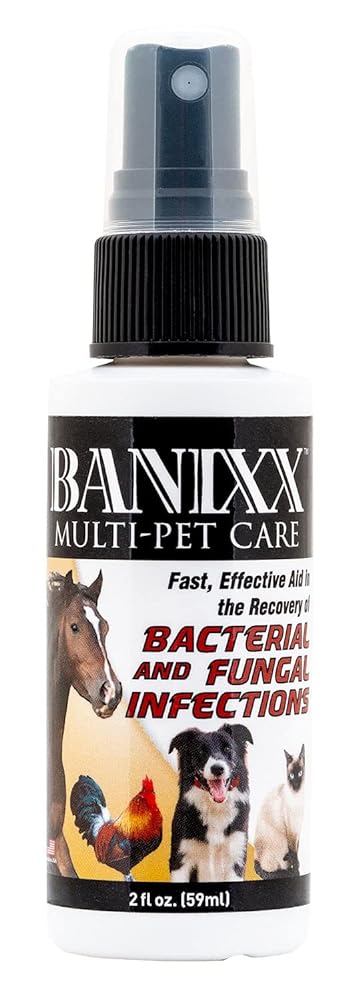
#2 – Veterinary Formula Clinical Care Antiseptic and Antifungal Medicated Shampoo for Dogs & Cats, 16oz – Helps Alleviate Scaly, Greasy, red Skin – Paraben, Dye, Soap-Free
The Veterinary Formula Clinical Care Antiseptic and Antifungal Medicated Shampoo is designed to alleviate various skin conditions in dogs and cats. Its powerful ingredients work to soothe red, scaly, greasy, or smelly skin, providing relief to pets that may be experiencing discomfort. This vet-recommended shampoo is pH-balanced and free of parabens and soap, promoting overall skin and coat health without causing damage. It is intended for use on pets over 12 weeks of age, and its application should be done carefully by following the instructions provided.
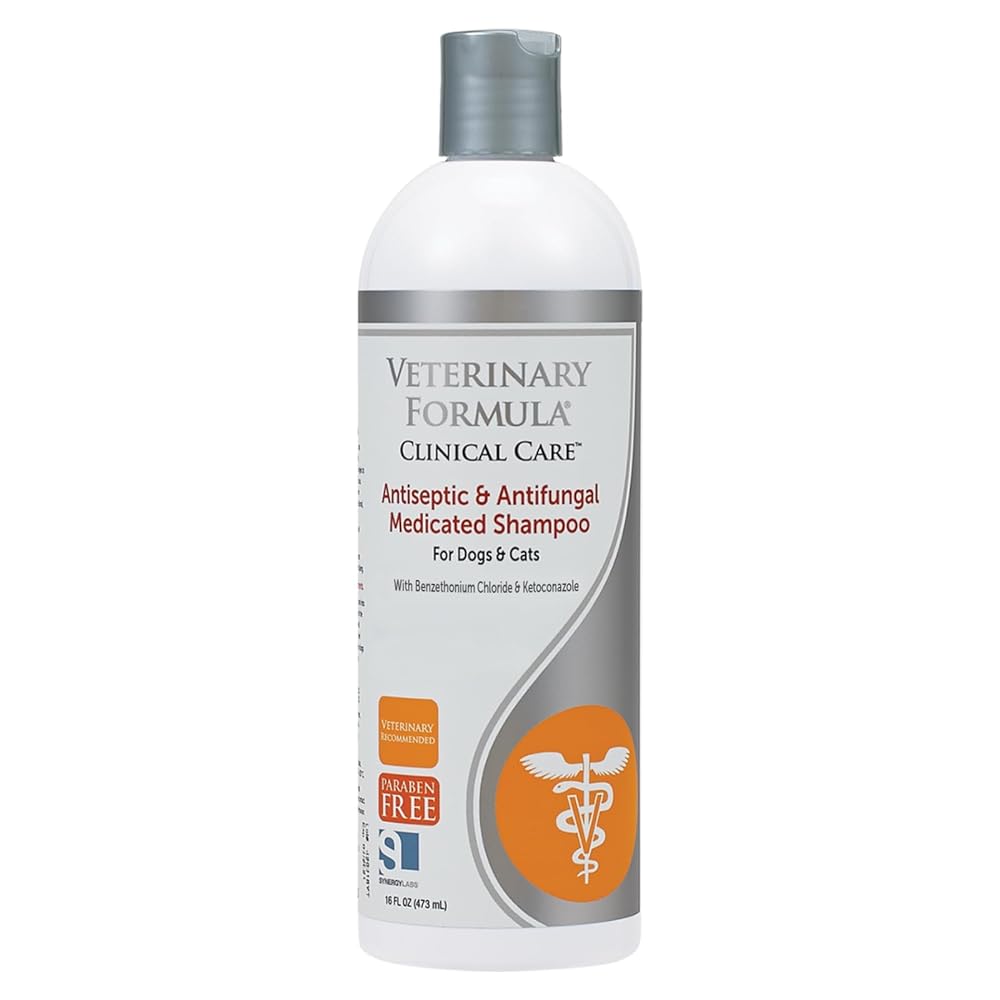
#3 – Thyme Out for Pets (8oz) – Natural Dog and Cat Itch Relief & Skin Treatment for Itchy Paws and Ringworm – Yeast Infection, Dandruff and Hot Spot Spray for Dogs – All Natural, Organic Blend
Thyme Out for Pets is a natural and organic itch relief and skin treatment spray for dogs and cats. It is formulated with organic Thyme and Aloe Vera to tackle fungal, bacterial, and viral issues, making it effective against pet rashes, hot spots, yeast infections, and bug bites. The easy-to-use dispenser tip allows for convenient application, and the pet-safe formula ensures that it is harmless if licked by animals. The product comes with a satisfaction guarantee, making it a risk-free purchase for pet owners.
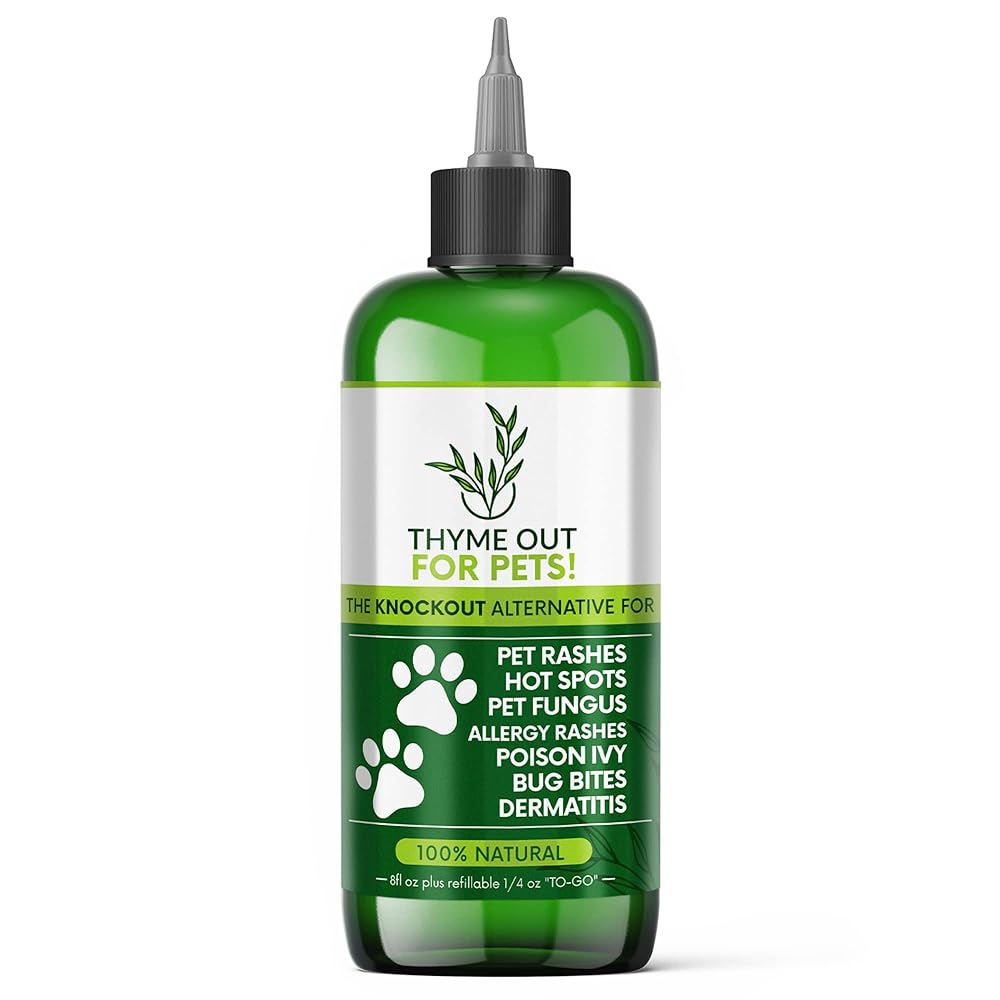
#4 – Pet MD Topical Spray for Dogs, Cats, and Horses with Essential Fatty Acids, Aloe, and Vitamin E – 8 oz
The Pet MD Topical Spray is an 8 oz solution that is designed to cleanse the skin and coat of dogs, cats, and horses. It contains essential fatty acids, aloe, and vitamin E, which work together to promote healthy skin and coat. This non-stinging spray is convenient for in-between baths and can be used to cleanse various areas such as face folds, finger folds, underarms, and groin. It is made in the USA in regulated manufacturing facilities to guarantee quality and safety.
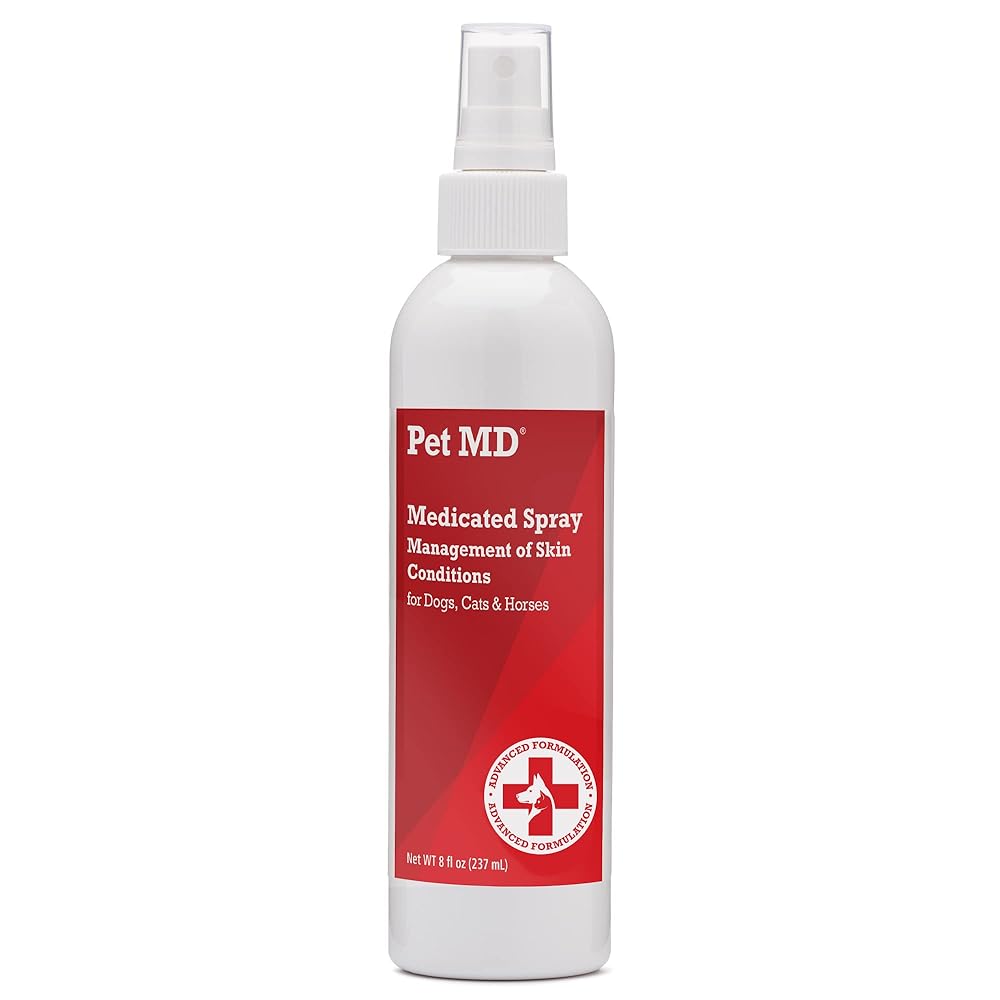
#5 – Forticept Blue Butter – Hot Spot Treatment for Dogs & Cats | Dog Wound Care | Skin Yeast Infections, Ringworm, Cuts, Rashes, First Aid Veterinary Strength Topical Ointment 4oz
Forticept Blue Butter is a first-aid solution for wound care in dogs and cats. It is formulated to treat a variety of skin infections, including cuts, scrapes, rashes, and yeast infections. The gel promotes healing and disinfects wounds, creating an optimal environment for ultimate healing. Blue Butter is safe to use, non-toxic, and gentle on the skin, making it a recommended choice by veterinary doctors for wound management in pets.
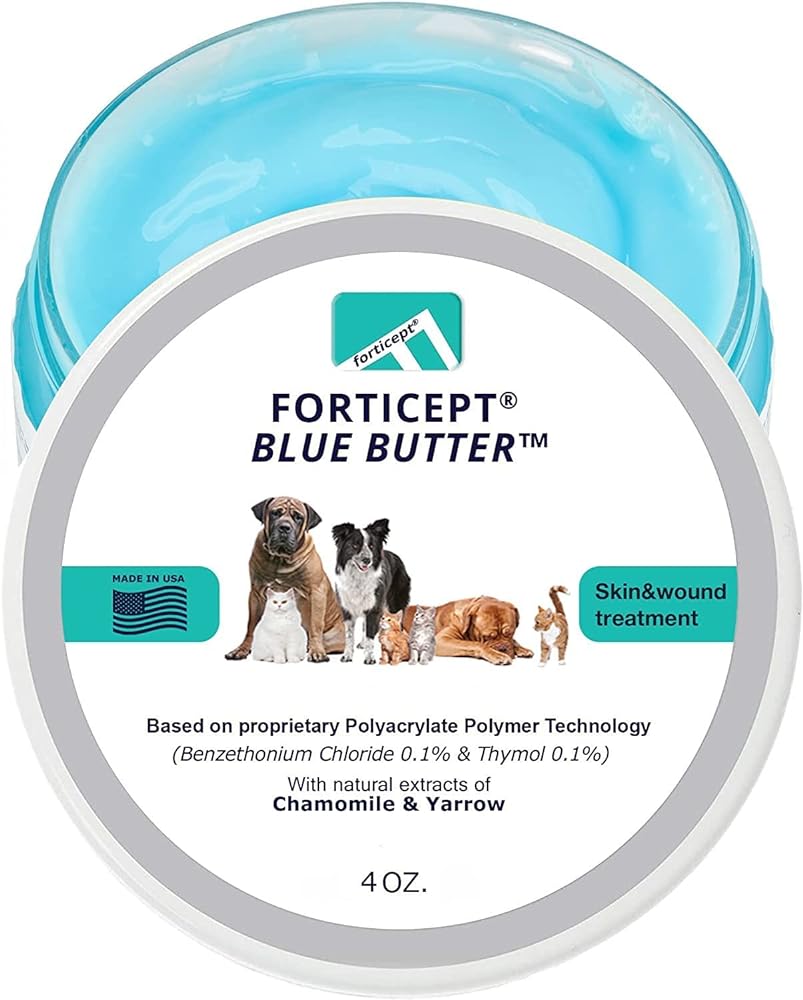
#6 – Smiling Paws Pets – Antibacterial & Antifungal Wipes for Dogs & Cats (with Chlorhexidine & Ketoconazole)
The Smiling Paws Pets Antibacterial & Antifungal Wipes for Dogs & Cats are medicated wipes specifically designed to treat and eliminate various skin infections in cats and dogs. The wipes contain Ketoconazole and Chlorhexidine, which are effective in treating conditions such as yeast infections, fungus, bacteria, mange, ringworm, hotspots, and pyoderma. The wipes are small and thin, making them easy to use and fit into tight spaces such as paws without causing discomfort. The product also includes soothing ingredients like Aloe and Essential Fatty Acids to help alleviate infected areas. The company offers a satisfaction guarantee, and the wipes are made in the USA in regulated facilities.
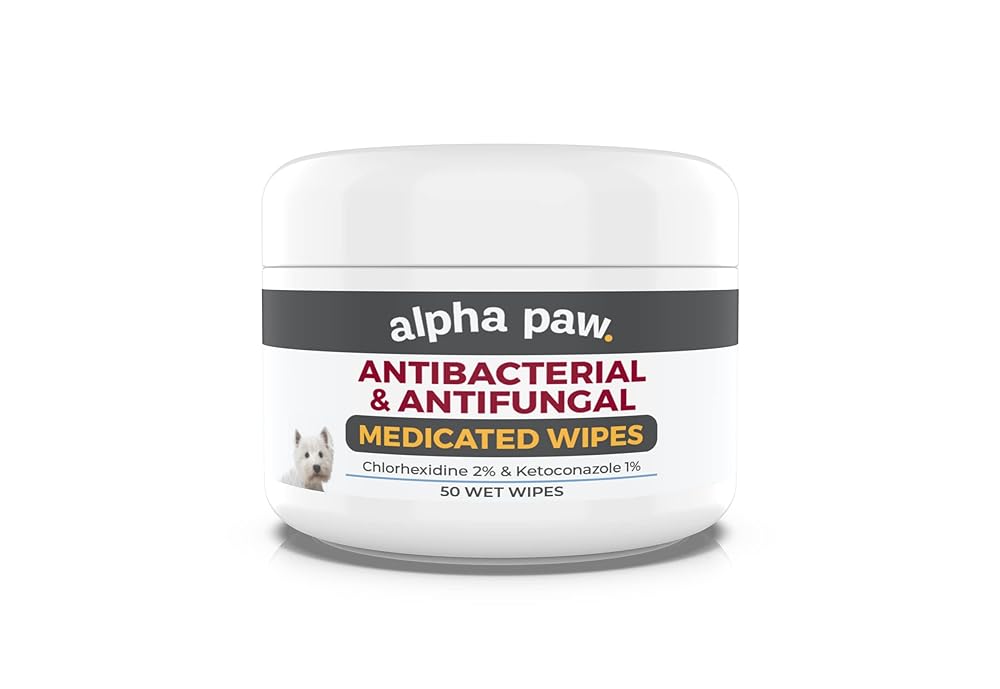
#7 – Nootie Medicated Dog Wipes, 2% Chlorhexidine and 2% Miconazole Formulated Pet Wipes for Dogs and Cats – 2” Small Pet Wipes – 60 Count – Sold in Over 10,000 Vet Clinics and Pet Stores Worldwide
The Nootie Medicated Dog Wipes are specifically formulated for dogs and cats and contain active ingredients such as 2% Chlorhexidine Gluconate and 2% Miconazole Nitrate. These wipes can provide relief for pets suffering from ear infections, skin conditions, ringworm, hotspots, and allergy dermatitis. The wipes are free of harsh chemicals and are manufactured in the USA in an FDA facility for quality and safety.

#8 – HAPPY JACK Xylecide, Itch Relief Shampoo for Dogs, Control Ringworms, Itchy Skin Treatment for Hot Spots, Seborrheic Dermatitis, Dandruff, Psoriasis, Eczema, Kennel Itch (12 oz)
The HAPPY JACK Xylecide Itch Relief Shampoo for Dogs is a product that claims to provide relief for dogs suffering from various skin problems such as ringworms, hot spots, seborrheic dermatitis, dandruff, psoriasis, eczema, and kennel itch. It is formulated to control the spread of ringworms to other areas, including humans and other pets. The shampoo is said to act quickly, providing comfort and relief to pets within a few days. The product is made in the USA and has been trusted for over 70 years in providing effective control for ringworms, mites, and fleas.
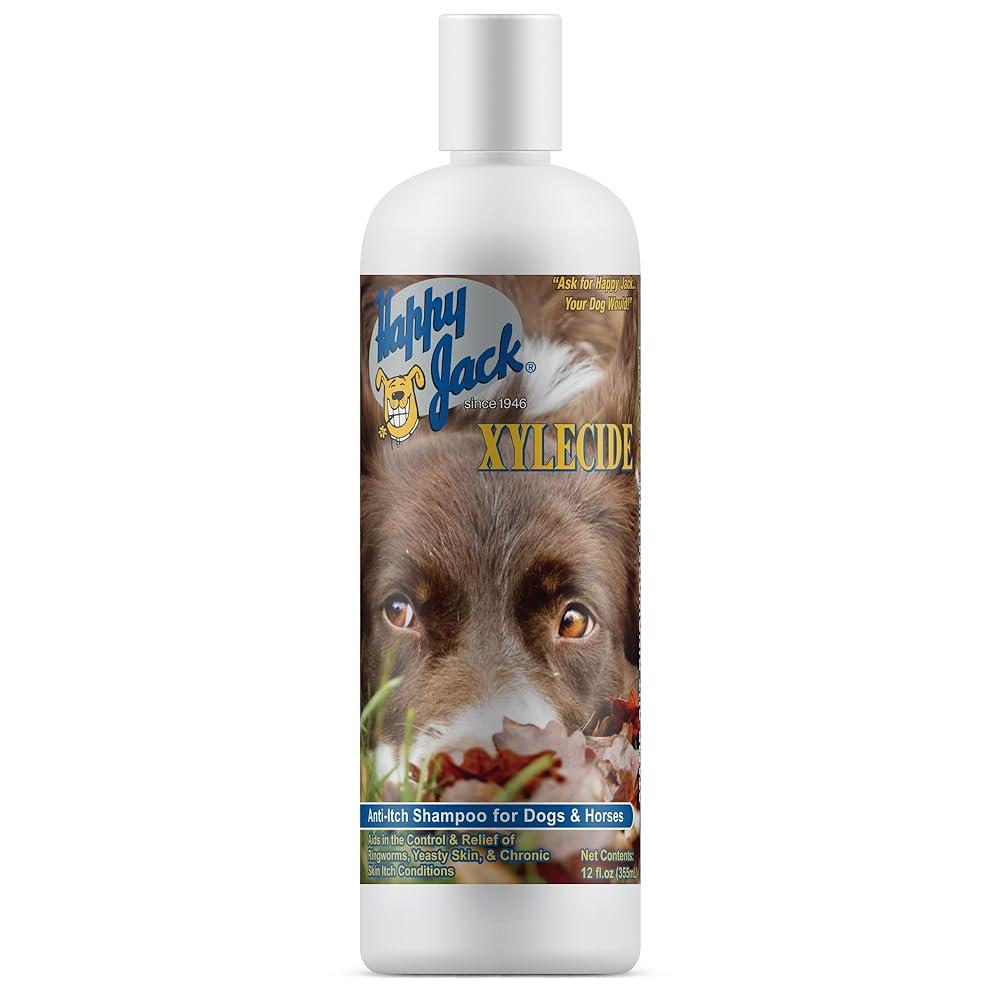
What Should I Consider When Purchasing a Dog Ringworm Treatment?
When purchasing a dog ringworm treatment, several essential considerations come to the forefront to ensure the safety and effectiveness of the remedy:
- Consultation with a Veterinarian: Before administering any treatment, it’s imperative to consult with a veterinarian to confirm the diagnosis and get recommendations tailored to your dog’s specific needs.
- Ingredients: Look for active antifungal ingredients known to be effective against ringworm, such as miconazole, clotrimazole, or ketoconazole. Ensure there aren’t any harmful chemicals or potential allergens that might irritate your dog’s skin further.
- Safety: Opt for treatments that are labeled safe for pets. Avoid products that contain harmful chemicals or additives that can be toxic if ingested, especially if your dog is prone to licking their skin.
- Ease of Application: Some treatments come in the form of shampoos, creams, or sprays. Choose a format that you believe would be easiest for you to apply and for your dog to tolerate.
- Duration of Treatment: Some treatments require prolonged use before results are evident, while others might act faster. Always follow the recommended duration and never stop treatment prematurely.
- Reviews and Recommendations: It can be helpful to check reviews from other dog owners who’ve used the product. Their experiences can provide insights into the product’s effectiveness and any potential side effects.
- Brand Reputation: Reputable brands that specialize in pet care or health products are generally more trustworthy. It’s worth investing in a high-quality product from a well-known brand to ensure safety and efficacy.
- Potential Side Effects: Some dogs might have a sensitive reaction to certain treatments. Always monitor your dog after applying any new treatment to spot any adverse reactions.
- Price vs. Quality: While cost is a consideration, it shouldn’t be the only factor. A cheaper product might not be as effective or could even be harmful. It’s better to invest in a slightly more expensive but proven and safe product.
- Other Health Concerns: If your dog has other skin conditions or health issues, you’ll want to ensure that the ringworm treatment won’t exacerbate those problems.
In all cases, ongoing communication with your vet is crucial. They can provide guidance tailored to your dog’s specific situation and adjust treatments as necessary.
How Do Dogs Get Ringworm?
Ringworm, contrary to its name, is not caused by a worm but rather by a group of fungi known as dermatophytes. Dogs can contract ringworm through several means:
- Direct Contact with Infected Animals: One of the most common ways dogs get ringworm is through direct skin-to-skin contact with an infected animal. This can be another dog, cat, or even a small mammal like a guinea pig or rabbit.
- Contact with Contaminated Objects or Environment: Ringworm spores can survive on various objects and surfaces for a long time. Dogs can get infected by coming into contact with contaminated bedding, dishes, toys, brushes, or other grooming equipment. They can also contract the fungus from spores present in a contaminated environment, like kennels, dog parks, or veterinary clinics.
- From Soil: Some species of the dermatophyte fungi that cause ringworm live in the soil. Dogs can get infected if they spend time in areas where these fungi are present in the ground.
- Humans to Dogs: Humans infected with ringworm can also transmit the fungus to their dogs through direct contact.
- Broken Skin: Dogs with wounds, cuts, or broken skin are more susceptible as these areas can provide an easy entry point for the fungus.
- Weak Immune System: Puppies, elderly dogs, or those with compromised immune systems due to illness or medications are more susceptible to contracting ringworm as their defenses are lowered.
It’s essential to be vigilant and practice good hygiene to prevent the spread of ringworm. Regularly cleaning and disinfecting your dog’s environment and belongings, as well as early detection and treatment of any signs of infection, can help in managing and controlling this condition.
Frequently Asked Questions About Dog Ringworm Treatments
- What is ringworm, and is it actually caused by a worm? Ringworm is a fungal infection and, despite its name, is not caused by a worm. It’s caused by a group of fungi known as dermatophytes, which affect the skin, hair, and nails.
- How will I know if my dog has ringworm? Common signs include circular patches of hair loss, redness, scaling, crusting, and sometimes itching. The patches might have a red ring around them, resembling a worm in the shape of a ring, leading to its name.
- Is ringworm contagious to other pets and humans? Yes, ringworm is zoonotic, meaning it can spread between animals and humans. It’s essential to practice good hygiene and isolate the infected dog to prevent the spread.
- How is ringworm diagnosed in dogs? A veterinarian typically diagnoses ringworm using a Wood’s lamp, fungal culture, or by examining a skin biopsy under the microscope.
- What treatments are available for dog ringworm? Topical treatments like antifungal shampoos, ointments, and creams are common. In severe cases, oral antifungal medications may be prescribed.
- How long will it take for the ringworm to clear up with treatment? With proper treatment, most cases start to improve within 1-2 weeks. However, the entire course of treatment must be completed to prevent recurrence.
- Can I prevent my dog from getting ringworm again? Maintaining a clean environment, regularly disinfecting your dog’s belongings, and avoiding contact with infected animals can reduce the risk of recurrence.
- Is there a vaccine for ringworm in dogs? Currently, there is no vaccine available to protect dogs from ringworm.
- Can I use over-the-counter antifungal creams meant for humans on my dog? While some human antifungal creams might be safe for dogs, it’s essential to consult with a veterinarian before applying any medication to ensure its safety and effectiveness.
- How can I protect myself while treating my dog for ringworm? Wear gloves when applying topical treatments, wash your hands thoroughly after handling your dog, avoid close contact like cuddling, and keep your dog’s environment clean and disinfected.
Conclusion: Best Dog Ringworm Treatments
Navigating through the sea of treatments for dog ringworm can be daunting, but armed with the right knowledge, pet owners can make informed decisions that prioritize their dog’s health and comfort. Always consult with a veterinarian before making any treatment decisions, and ensure that you follow their guidance to the letter. With prompt and appropriate treatment, your dog can be ringworm-free and back to their cheerful, playful self in no time.
 Toledo, United States.
Toledo, United States.